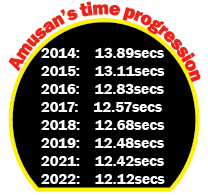
From a humble childhood in Oregun, Ijebu Ode, where she and her siblings lived in a one-bedroom apartment, Tobi Amusan pushed her way to victory through courage, hard work and determination to become Nigeria’s greatest sprinter of all time, writes JOHNNY EDWARD
The usually sleepy town of Oregun in Ijebu Ode, the eastern part of Ogun State, came alive in the early hours of Monday as youths in their hundreds turned up at hurdler Tobi Amusan’s family home, located just opposite a gas station, Con Oil, to celebrate the heroics of one of the town’s illustrious daughters.
While some danced their way first to her Alma Mata, Our Lady of Apostles Secondary School, where her talent was first spotted, others danced along the streets carrying her poster. Some others joined a rally in celebration of the hurdler along the bad roads with unbridled joy to the Dipo Dina Stadium where she trained when around.
Despite the poorly maintained and untarred roads that led to her family house, indigenes of Oregun – market women, motorcyclists, popularly known as okada riders, and artisans were in ecstatic mood as they trooped into the home of the Amusans to celebrate Tobi’s feat in Oregon, USA.
The 25-year-old had just become the first-ever Nigerian athletics world champion and record holder in the 100m hurdles event at the World Athletics Championships in Oregon.
She ran a time of 12.12secs – shaving almost a tenth of a second off the previous world record held by American Keni Harrison (12.20secs) – in the semi-finals of the event, before going on to win gold in the final at the Hayward Field stadium two hours later.
Her winning time of 12.06secs in the final was not recognised as a world record, however, due to regulations over a strong tailwind assisting runners.
Her climb to global reckoning has been one of near misses, failing to make podium finish when it mattered most and always after fine performances on the way to the finals of her event. Indeed, she came fourth at the 2019 World Championships in Doha and at the delayed Tokyo Olympics in 2020.
But her persistence finally paid off on Monday, as she engraved her name in the track and field folklore with her outstanding performance that got the world dazed, athletics great like Michael Johnson dazed.
AMUSAN’S HOME

When our correspondent visited the Amusans on Tuesday, he discovered that like most athletes from this clime, Tobi was born without a silver spoon and fought her way through a thorny and challenging journey to the top.
There was mild traffic at the roundabout leading to the Amusans’ home, as residents, in their numbers, hovered around, braving the cold and light showers on the day to celebrate their new athletics queen at her family house.
As I approached the home of the Amusans, I was three men in front of a shop discussing. I approached them for direction on how to meet members of the athlete’s family. Luckily, one of the men, Samuel, is Amusan’s uncle.
Interestingly, the home of the Amusans doesn’t smack of that of a world champion’s abode. The one-story mud building’s brown painting is weather beaten, some parts of the roof, which had pulled off, perhaps due to ageing, had just been replaced.
Samuel was still in a jubilant mood when I met him.
“At a point, we had to leave the scene for the residents who came to felicitate with us in large numbers,” he told Saturday PUNCH.
“They were all overjoyed. Those who didn’t even know her before celebrated her here. They are also planning to celebrate Tobi when she returns back from the Commonwealth Games.”
Memunat Abdulazeez, who sells building materials in the shop in front of the house, said her joy was beyond bounds following Amusan’s triumph.
“I am so happy for Tobi and her family. It’s unbelievable, the fastest woman in hurdles now is from Oregun. We are proud of her achievement and that was why we celebrated her the way we did,” she told our correspondent in Yoruba.
An Okada rider, who was waiting for passengers to Ilese, the next town, said, “This place has been quiet for a while now, but the news of her race brought joy to everybody.”
THE BEGINNING
Amusan started as a footballer while at OLASS, but because of her small stature – 5ft1in now – she was advised to consider athletics as an option, and immediately, she became the fastest girl on the relay team.
As a standout athlete, she joined Buka Tiger Athletics Club – owned by popular grassroots athletics coach Ayodele Solaja – at just 13, and from there she further developed as an athlete.
It was evident every time she stepped on the track to race in training.
“We told Tobi to join the relay team because of her pace and strength and she right away took interest in athletics,” the Registrar, OLASS, Adeeko Lateef, told Saturday PUNCH.
“It was from that point she got the chance to represen the school at inter-school sports events. At that time she was also training at the Dipo Dina Stadium, which helped her in developing at such tender age. She graduated from OLASS in 2011, the last set in the public section of the school, before the schools were handed back to the missionaries.”
Adeeko added that Saidat Onanuga, 48, who represented Nigeria in several global events, including the 1992 World Juniors in Seoul, the African Championships in 1996 and 1998 editions, as well as the African Games in 1999, was also an alumni of OLASS.
“Tobi is not the only athlete that the school has produced, we have so many others. Onanuga s also among the top athletes the school has produced.”
OLASS Principal, Olujoke Adelaja, told our correspondent that sports brought Amusan to prominence at the school.
“Tobi was not really popular in school at that time, until she joined the sports relay team,” Adelaja said.
“She was the easy-going type and hardly would you notice her around, but when it was time for sports, she was seen everywhere running.
“As a school, we try to have an impact on our students when we notice their talent. Certainly, we have had some sportsmen and women who’ve gone far in sports, but Tobi had the personality and was consistently dominant in the sprints.”
UPBRINGING

Tobi and her two elder siblings grew up with their parents, who were both teachers, in a one-bedroom apartment in Oregun.
She attended Golden Gate Primary School, along Oke Owa Road, Ijebu Ode, before she was admitted to Our Lady of Apostles Secondary School.
As a young girl, she was also a member of the choir of the Celestial Church of Christ, Ileri Ayo Parish, at and used her music classes as an avenue for her to sneak out to train at the Dipo Dina Stadium, about 1,500m away from where they lived.
At OLASS, after leaving primary school, and just 13, Amusan became the school’s fastest 100m runner after switching from football. Her track and field career flourished after several coaches noticed her huge athletic ability and began focusing on her.

However, the odds were stacked against her from the beginning, as her father, Kehinde, vehemently kicked against her becoming an athlete, rather preferring her to pursue a career in Medicine.
But her mother, who was also an athlete, gave her the support she needed, though without the father’s knowledge.
In an interview with BBC, after she stunned the world to become champion, Amusan said, “My mum would tell my dad I was going to church, while I sneaked to practice or tell him I was going to a school debate, while I went to out-of-state competition. That’s where it all started.
“My dad got really mad one time when he found out (I was running). He burned all my training gear.”
But the father told our correspondent that he set her daughter’s kits ablaze because he wanted his daughter to become a doctor and not a “street runner.”
Kehinde said, “Back then as a teacher we earned meagre salaries, we struggled to feed and pay school fees, so adding an extra cost for her training and competitions would add more burden to the family and only make it more difficult to survive.
“I told her to shun athletics because I did not want her to go through the struggles of putting so much efforts and not getting rewarded.
“As a parent, I wanted good jobs for my children, my thoughts were for her (Amusan) to succeed. Nobody knew what the future held for her. What we wanted was for her to become a doctor, a lawyer, or a journalist, but not a street runner as we believed at that time.
“How would you say you want to become a doctor growing up and all of a sudden you’re opting for sprinting? I told her we will not support her because back then Nigerians believed youngsters who ran, played football were just wasting their time.
“But now I feel happy seeing her become a world champion and has taken the family’s name to greater heights. We are all happy now.”
DIPO DINA STADIUM

When our correspondent visited the Dipo Dina Stadium to catch a glimpse of the mood at the sporting arena, where Amusan trained with Buka Tiger Athletics Club, traders and athletes who came for their routine sessions, were still basking in the euphoria of the world champion’s heroic feat.
“We recommended her first pair of track shoes and we provided whatever she needed at that time. When she became the world champion, I was so proud. We all jubilated here, along with other sportsmen and women who were here,” Solaja, owner of Buka Athletics Club, who horned Amusan’s running skills, said.
“Tobi loved competitions. I remember one year she was in the 100m final in a competition here and the time for the event clashed with her lesson. We thought she would not make it, but she turned up on time, despite the stress of getting to the stadium. She’s a real warrior and deserves all the recognition she is getting at the moment.”
Bukola Jasper, an Ijebu Ode-based athlete, who won gold in the 4x100m event at the 2019 African Games in Congo Brazzaville, told Saturday PUNCH, “We all, who were her seniors, feel great. She trains here (Dipo Dina stadium in Ijebu Ode) and she is a dedicated athlete.
“We all knew she was an outstanding talent growing but nobody could project when she was going to blossom. But we knew she was destined for greatness. I’m so proud of her, seeing her develop well from the juniors to the level she is now – a world record holder and champion.”
MILESTONES

Amusan served notice of her immense talent when she won the African Games 100m hurdles title in Congo Brazzaville as an 18-year-old.
The reigning Commonwealth Games champion is also the only sprint hurdler in Africa to run a sub-12.40secs. She had earlier joined Glory Alozie as the second Nigerian and African woman to break 12.50secs when she ran 12.49secs at the Paris Diamond League in 2019.
At the 2019 African Games in Rabat, Morocco, Amusan won the 100m hurdles gold in an amazing manner, setting two games record on her way to the podium. She started with a 12.69secs to break Glory Alozie’s 12.74secs record achieved 20 years earlier in Johannesburg, South Africa. She then broke her own Games record in the final, running 12.68secs to win the title.
Before Oregon 2022, Alozie held the honour of being the fastest Nigerian over the 100m hurdles at the World Athletics Championships, courtesy of the 12.44secs she ran to win the silver medal in the event at the seventh edition of the Championships in Seville, Spain in 1999.
Twenty-three years later, Amusan first ran 12.40secs in the first round to become the fastest Nigerian in the event in the history of the Championships. The 25-year-old took it to a new level with her stunning 12.12secs world record performance.
Amusan’s 12.54secs finish at the Nigerian Championships in Benin City in June is also the fastest time ever ran at the event, erasing Angela Atede’s 12.63secs performance achieved in June 1997 in Lagos.
The UTEP alumnus made history at the Weltklasse in Zurich last year, when she ran 12.42secs to break Glory Alozie’s African record, set in 1998. The time propelled Amusan to win the 100m hurdles title, the first by a Nigerian in any event in the Diamond League era
Despite placing fourth in the finals of the hurdles event, her 12.60secs run in the final of the delayed Tokyo Olympics is the fastest time by a Nigerian in the history of the country’s participation at the Games.
Alozie, who won an Olympic silver medal, held the record before Amusan’s arrival. She ran 12.68secs in the final in Sydney to win the silver and emerged Nigeria’s fastest girl at the time.





